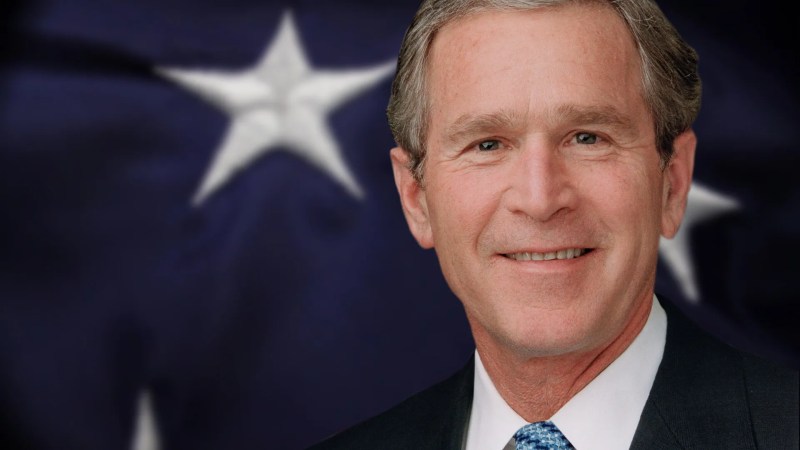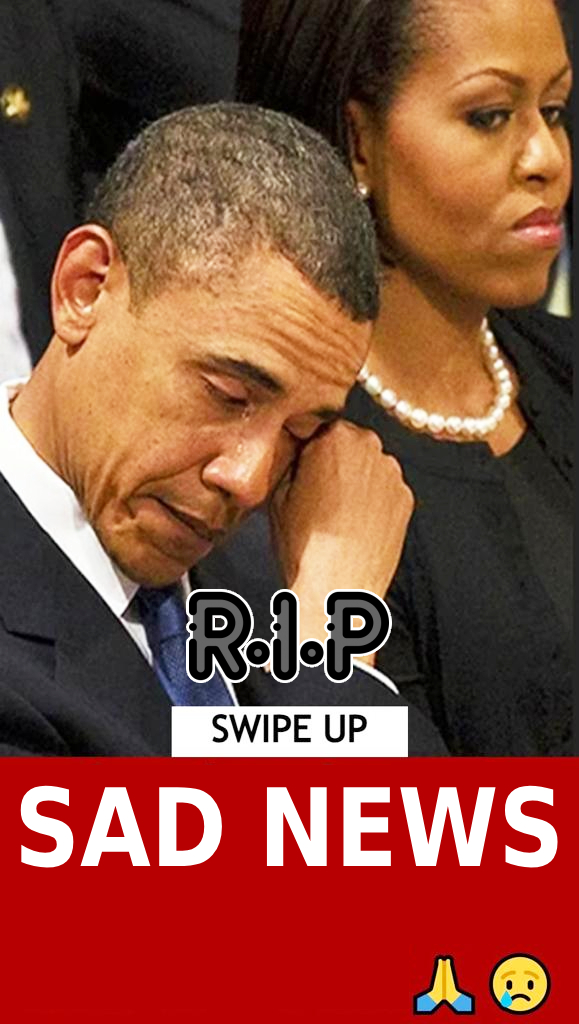
MILWAUKEE – Many Republican convention delegates like to salute the heritage of their party, but few of them these days talk about the next-to-last GOP president, George W. Bush.
And that suits Bush just fine.
For while Bush still keeps up with politics – including the resurgence of Republican successor and fervent critic Donald Trump – he doesn’t like to talk about it publicly.
In paid private speeches, the long-retired 43rd president has been known to joke that both Trump and President Joe Biden are too old for the demands of the office.
“I’m younger than both of the candidates, and I’m too old,” Bush has said in at least one speech, according to a witness who requested anonymity.
Just don’t expect Bush, who turned 78 earlier this month, to say this kind of thing out loud – not even about Trump, the volatile businessman who built his political career in part by trashing the legacy of the Bush dynasty
While people often call on Bush to speak out against Trump and the Republican Party he has remade in his own image, friends and associates said he is standing by his pledge not to critique other presidents and political leaders.
“The job of the president is very hard to begin with,” Ari Fleischer, former White House press secretary for Bush, told USA TODAY. “He doesn’t want to make it harder for anyone, friend or foe.”
“It’s very old school,” Fleischer added. “It’s very gracious. It’s very Bush.”
It also has public benefits for the former president – his approval ratings have more than doubled since he left office more than 15 years ago.
Bush has made the rare exceptions on his public comment policy, most recently a statement with former First Lady Laura Bush after last Saturday’s assassination attempt against Trump.
“Laura and I are grateful that President Trump is safe following the cowardly attack on his life,” Bush said. “And we commend the men and women of the Secret Service for their speedy response.”
Since leaving office on Jan. 20, 2009, Bush has made his mark as a book author, the head of an institute based in Dallas, and even as a portrait painter – but not a political pundit.
“He’s turned the page,” said Margaret Spellings, a long-time friend who served as Education Secretary during the Bush administration. “He’s interested and he’s connected and he’s informed – but he’s moved on.”
And vice-versa.
When Republican conventioneers gather in Milwaukee next week to nominate Trump for a third time, the name of George W. Bush may never be heard.
Privately, Bush still follows current events. He gives speeches. He paints. Over the past decade-and-a-half, Bush has hosted dozens of fundraisers for favored Republican candidates, all behind closed doors.
Publicly: not much. Instead, Bush has pursued a unique path for an ex-president, all but walking away from political life. This from the grandson of a U.S. senator and the son of a president, the scion of an historic political family.
Bush has occasionally tangled with Trump, but it hasn’t amounted to much.
In February of 2016, the former president stumped for younger brother Jeb Bush in his faltering Republican primary campaign against the first-time candidate Trump. Bush praised his sibling’s qualifications, drawing implicit contrasts with Trump by talking about “faith that reveals itself through good works, not loud words.”
That became a part-time pattern after Trump became president. Bush would not call out Trump by name, but made clear he didn’t like his divisive style, and sometimes getting blowback from Trump in process.
After Trump’s inaugural address in 2017 – the speech in which the new president talked about American “carnage” – Bush nor his aides disputed his reported reaction: “That was some weird s—.”
During a 2021 ceremony in Pennsylvania to mark the 20th anniversary of the 9/11 terror attacks, Bush made a point of saying that “so much of our politics has become a naked appeal to anger, fear and resentment.”
Trump, who has often attacked Bush over the invasion of Iraq, said his GOP predecessor “shouldn’t be lecturing us about anything.” He added that “the World Trade Center came down during his watch.”
Bush did leave office with very low approval ratings, sometimes well below 40%, in the wake of criticism of the Iraq war and the financial crisis of 2008. They’ve since jumped above 60%.
After the attempted insurrection by Trump loyalists on Jan. 6, 2021, Bush issued a statement saying that he and Laura Bush found it “a sickening and heartbreaking sight.”
While, again, not citing Trump by name, Bush added: “This is how election results are disputed in a banana republic – not our democratic republic.”
In describing Bush’s approach, Fleischer said: “He doesn’t attack, but he knows how to roll his eyes at things he doesn’t like.”
Bush has remained quiet during Trump’s re-emergence and march toward the 2024 Republican presidential nomination. He did not comment on the four sets of indictments against Trump, nor the hush money trial that made him the first convicted felon to seek the presidency from a major party.
Bush has also resisted a steady string of entreaties for him to “say something.”
On July 6, Bush’s birthday, anti-Trump lawyer George Conway used the social media site X to send a unique salutation: “Happy Birthday, Mr. President. Could you do the country a big favor and urge it not to elect a certain convicted felon and psychopath whom I assume you detest as much as the rest of us? Thanks in advance!”
Friends and associates said there’s no real reason for Bush to engage.
For one thing, Bush is a Republican, and believes that a food fight with Trump would only help the Democrats, they said. Bush probably wouldn’t gain much by it either.
Bush also feels, whatever the provocation, he owes Trump the same respect as all his other presidential colleagues.
“He just doesn’t want to be in the game any more,” said presidential historian Mark Updegrove, who pointed out that Bush uses the same phrase as Trump to describe the political environment: Swamp.
Said Updegrove: “When I spoke to Bush shortly after he left the presidency, he said, ‘the scene is a swamp out there right now, and I don’t want to get in the swamp.’ … Since then it’s only gotten swampier.”
Updegrove, author of “The Last Republicans: Inside the Extraordinary Relationship Between George H.W. Bush and George W. Bush,” said Trump-type Republicans wouldn’t respond to Bush criticism anyway.
“His influence in the party has waned,” he said. “It’s an entirely different party.”

Bush still has a public policy life
Friends and associates said Bush has only withdrawn, mostly, from political life – not public life.
The former president does speak out frequently on policy issues, mostly through his work with the George W. Bush Presidential Center at Southern Methodist University in Dallas. It houses the Bush Institute, a nonpartisan policy organization, as well as his presidential museum.
The former president and his wife appear at events devoted to subjects that animated his presidency, including education, immigration, and help for veterans and military families. Another frequent topic is “strengthening democracy, and advancing free societies.”
“What he’s wanted to do is to have the institute and the center focus on the issues that were important to him and Mrs. Bush when they were in Washington,” said David J. Kramer, executive director of the George W. Bush Institute.
That also means the institute likes to avoid politics as much as possible, especially in these volatile times.
“A lot of things get very polarized very quickly,” Kramer said.

Author, painter
Since leaving office, Bush has performed a more tradition role for former presidents: Book author.
A memoir of his White House years, “Decision Points,” came out in 2010. He also wrote a short biography of President George H.W. Bush entitled “41: A Portrait of My Father,” published in 2014.
The younger Bush has also pursued a non-traditional pastime: Painting. Two books of portrait paintings have touched on Bush-era issues, veterans and migrants.
“Portraits in Courage: A Commander-in-Chief’s Tribute to America’s Warriors,” came out in 2017. Then came “Out of Many, One: Portraits of America’s Immigrants,” published in 2021.
None of these books include the word “Trump.”

A little politics – in private
Bush also periodically comments on the news. After a private event in October, his office agreed to publicize his remarks about the Oct. 7 Hamas attack on Israel.
“Don’t be surprised if Israel takes whatever actions necessary to defend herself,” Bush said at the event moderated by Updegrove. “It’s going to be ugly for a while.”
Over the years, Bush has hosted dozens of fundraisers for favored Republican candidates. This year’s list has included Republican Senate candidates Dave McCormick of Pennsylvania and Larry Hogan of Maryland. He also has an upcoming event for Maine Sen. Susan Collins, who faces her next reelection in 2026 and opted to skip this week’s RNC in Milwaukee to attend, among others, an event honoring the retiring director of her state’s Potato Board.
An event in 2021 drew attention from Trump, as Bush headlined a fundraiser for Rep. Liz Cheney of Wyoming, a GOP member of the congressional committee that investigated Trump’s role in the Jan. 6 insurrection. She is also the daughter of Bush’s vice president, Dick Cheney, who has criticized Trump several times over the years.
“Bush is the one who got us into the quicksand of the Middle East,” Trump said in a statement that criticized the fundraiser.
Bush did not respond.

Higher approval
Bush’s reticence to inject himself into politics has paid off in terms of public opinion.
His approval ratings are consistently more than 60%, well above what they were in his later years as president, noted Jared Cohen, author of “Life After Power: Seven Presidents and Their Search For Purpose Beyond the White House.”
In the book – which is sold at the Bush museum bookstore – Cohen noted that Bush has prospered with public opinion even though his Republican successor, Trump, rejected many of his policies (and Democrats never approved him in the first place).
“He moved on from politics, and in an age when everything is political, that’s earned him respect.” Cohen said.
For his part, Bush still likes to joke that historians are still debating aspects of “the first George W” – George Washington.
“Whatever the verdict on my presidency, I’m comfortable with the fact that I won’t be around to hear it,” Bush wrote in the epilogue of his memoir. “That’s a decision point only history will reach.”
president of United States
George W. Bush (born July 6, 1946, New Haven, Connecticut, U.S.) 43rd president of the United States (2001–09), who led his country’s response to the September 11 terrorist attacks in 2001 and initiated the Iraq War in 2003. Narrowly winning the electoral college vote in 2000 over Vice Pres. Al Gore in one of the closest and most-controversial elections in American history, George W. Bush became the first person since Benjamin Harrison in 1888 to be elected president despite having lost the nationwide popular vote. Before his election as president, Bush was a businessman and served as governor of Texas (1995–2000).

Early life
Bush was the eldest of six children of George H.W. Bush, who served as the 41st president of the United States (1989–93), and Barbara Bush. His paternal grandfather, Prescott Bush, was a U.S. senator from Connecticut (1952–63). The younger Bush grew up largely in Midland and Houston, Texas. From 1961 to 1964 he attended Phillips Academy in Andover, Massachusetts, the boarding school from which his father had graduated. He received a bachelor’s degree in history from Yale University, his father’s and grandfather’s alma mater, in 1968. Bush was president of his fraternity and, like his father, a member of Yale’s secretive Skull and Bones society; unlike his father, he was only an average student and did not excel in athletics.
In May 1968, two weeks before his graduation from Yale and the expiration of his student draft deferment, Bush applied as a pilot trainee in the Texas Air National Guard, whose members were less likely than regular soldiers to fight in the Vietnam War. Commissioned a second lieutenant in July 1968, he became a certified fighter pilot in June 1970. In the fall of 1970, he applied for admission to the University of Texas law school but was rejected. Although Bush apparently missed at least eight months of duty between May 1972 and May 1973, he was granted an early discharge so that he could start Harvard Business School in the fall of 1973. His spotty military record resurfaced as a campaign issue in both the 2000 and 2004 presidential elections.
After receiving an M.B.A. from Harvard in 1975, Bush returned to Midland, where he began working for a Bush family friend, an oil and gas attorney, and later started his own oil and gas firm. He married Laura Welch, a teacher and librarian, in Midland in 1977. After an unsuccessful run for Congress in 1978, Bush devoted himself to building his business. With help from his uncle, who was then raising funds for Bush’s father’s campaign for the Republican presidential nomination, Bush was able to attract numerous prominent investors. The company struggled through the early 1980s until the eventual collapse of oil prices in 1986, when it was purchased by the Harken Energy Corporation. Bush received Harken stock, a job as a consultant to the company, and a seat on the company’s board of directors.
In the same year, shortly after his 40th birthday, Bush gave up drinking alcohol. “I realized,” he later explained, “that alcohol was beginning to crowd out my energies and could crowd, eventually, my affections for other people.” His decision was partly the result of a self-described spiritual awakening and a strengthening of his Christian faith that had begun the previous year, after a conversation with the Rev. Billy Graham, a Bush family friend.
After the sale of his company, Bush spent 18 months in Washington, D.C., working as an adviser and speechwriter in his father’s presidential campaign. Following the election in 1988, he moved to Dallas, where he and a former business partner organized a group of investors to purchase the Texas Rangers professional baseball team. Although Bush’s investment, which he made with a loan he obtained by using his Harken stock as collateral, was relatively small, his role as managing partner of the team brought him much exposure in the media and earned him a reputation as a successful businessman. When Bush’s partnership sold the team in 1998, Bush received nearly $15 million.

In 1994 Bush challenged Democratic incumbent Ann Richards for the governorship of Texas. A major issue in the campaign concerned Bush’s sale of all his Harken stock in June 1990, just days before the company completed a second quarter with heavy losses. An investigation by the Securities and Exchange Commission (SEC) in 1991 into the possibility of illegal insider trading (trading that takes advantage of information not available to the public) did not uncover any wrongdoing. Bush won the election with 53 percent of the vote (compared with 46 percent for Richards), thus becoming the first child of a U.S. president to be elected a state governor.
As governor, Bush increased state spending on elementary and secondary education and made the salaries and promotions of teachers and administrators contingent on their students’ performance on standardized tests. His administration increased the number of crimes for which juveniles could be sentenced to adult prisons following custody in juvenile detention and lowered to 14 the age at which children could be tried as adults. Throughout his tenure Bush received international attention for the brisk use of capital punishment in Texas relative to other states. Bush signed into law several measures aimed at tort reform, including one that imposed new limits on punitive damages and another that narrowed the legal definition of “gross negligence.” Reelected in 1998 with nearly 70 percent of the vote, Bush became the first Texas governor to win consecutive four-year terms (in 1972 voters had approved a referendum that extended the governor’s term from two years to four).

Bush formally announced his candidacy for the Republican presidential nomination in June 1999. He described his political philosophy as “compassionate conservatism,” a view that combined traditional Republican economic policies with concern for the underprivileged. Despite Bush’s refusal to give direct answers to questions about his drinking and possible use of illegal drugs (he implied that he had not used illegal drugs since 1974), he won the Republican nomination, taking a strong lead in public opinion polls over Vice Pres. Al Gore, the Democratic Party nominee; Ralph Nader, the Green Party candidate; and political journalist Patrick Buchanan, the nominee of the Reform Party. His running mate was Dick Cheney, former chief of staff for Pres. Gerald Ford and secretary of defense during the presidency of Bush’s father.
The Bush administration accused radical Islamist Osama bin Laden and his terrorist network, al-Qaeda (Arabic: “the Base”), of responsibility for the attacks and charged the Taliban government of Afghanistan with harbouring bin Laden and his followers (in a videotape in 2004, bin Laden acknowledged that he was responsible). After assembling an international military coalition, Bush ordered a massive bombing campaign against Afghanistan, which began on October 7, 2001. U.S.-led forces quickly toppled the Taliban government and routed al-Qaeda fighters, though bin Laden himself remained elusive (he was eventually killed in a raid by U.S. forces in Pakistan in 2011). In the wake of the September 11 attacks and during the war in Afghanistan, Bush’s public-approval ratings were the highest of his presidency, reaching 90 percent in some polls.

Domestic measures
In October 2001 the Bush administration introduced, and Congress quickly passed, the Uniting and Strengthening America by Providing Appropriate Tools Required to Intercept and Obstruct Terrorism Act (the USA PATRIOT Act), which significantly but temporarily expanded the search and surveillance powers of the Federal Bureau of Investigation and other law-enforcement agencies. (Most of the law’s provisions were made permanent in 2006 by the USA PATRIOT Improvement and Reauthorization Act.)
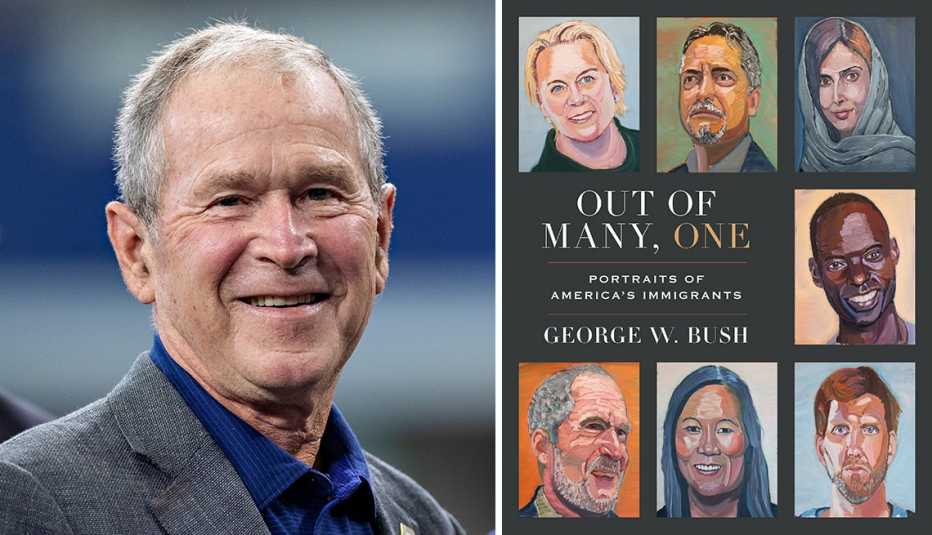
In January 2002 Bush secretly authorized the National Security Agency (NSA) to monitor the international telephone calls and e-mail messages of American citizens and others in the United States without first obtaining an order from the Foreign Intelligence Surveillance Court, as required by the Foreign Intelligence Surveillance Act of 1978. When the program was revealed in news reports in December 2005, the administration insisted that it was justified by a September 2001 joint Congressional resolution that authorized the president to use “all necessary and appropriate force” against those responsible for the September 11 attacks. Subsequent efforts in Congress to provide a legal basis for the spying became mired in debate over whether telecommunications companies that cooperated with the NSA should be granted retroactive immunity against numerous civil lawsuits. Legislation granting immunity and expanding the NSA’s surveillance powers was finally passed by Congress and signed by Bush in July 2008.
Treatment of detainees
In January 2002, as the pacification of Afghanistan continued, the United States began transferring captured Taliban fighters and suspected al-Qaeda members from Afghanistan to what became a special prison complex at the country’s permanent naval base at Guantánamo Bay, Cuba. Eventually hundreds of prisoners were held at the facility without charge and without the legal means to challenge their detentions (see habeas corpus). The administration argued that it was not obliged to grant basic constitutional protections to the prisoners, because the base was outside U.S. territory; nor was it required to observe the Geneva Conventions regarding the treatment of prisoners of war and civilians during wartime, because the conventions did not apply to “unlawful enemy combatants.” It further maintained that the president had the authority to place any individual, including an American citizen, in indefinite military custody without charge by declaring him an enemy combatant.
The prison complex at Guantánamo became the focus of international controversy in June 2004, after a confidential report by the International Committee of the Red Cross found that significant numbers of prisoners had been interrogated by means of techniques that were “tantamount to torture.” (The Bush administration had frequently and vigorously denied that the United States practiced torture.)
The leak of the report came just two months after the publication of photographs of abusive treatment of prisoners by American soldiers at the Abu Ghraib prison in Iraq (see below Iraq War). In response to the Abu Ghraib revelations, Congress eventually passed the Detainee Treatment Act, which banned the “cruel, inhuman, or degrading” treatment of prisoners in U.S. military custody. Although the measure became law with Bush’s signature in December 2005, he added a “signing statement” in which he reserved the right to set aside the law’s restrictions if he deemed them inconsistent with his constitutional powers as commander in chief.
In June 2006 the U.S. Supreme Court, in Hamdan v. Rumsfeld, declared that the system of military commissions that the administration had intended to use to try selected prisoners at Guantánamo on charges of war crimes was in violation of the Geneva Conventions and the Uniform Code of Military Justice, which governs American rules of courts-martial. Later that year, Congress passed the Military Commissions Act, which gave the commissions the express statutory basis that the court had found lacking; the law also prevented enemy combatants who were not American citizens from challenging their detention in the federal courts.
In separate programs run by the Central Intelligence Agency (CIA), dozens of individuals suspected of involvement in terrorism were abducted outside the United States and held in secret prisons in eastern Europe and elsewhere or transferred for interrogation to countries that routinely practiced torture. Although such extrajudicial transfers, or “extraordinary renditions,” had taken place during the Clinton administration, the Bush administration greatly expanded the practice after the September 11 attacks. Press reports of the renditions in 2005 sparked controversy in Europe and led to official investigations into whether some European governments had knowingly permitted rendition flights through their countries’ territories, an apparent violation of the human rights law of the European Union (see also European law).
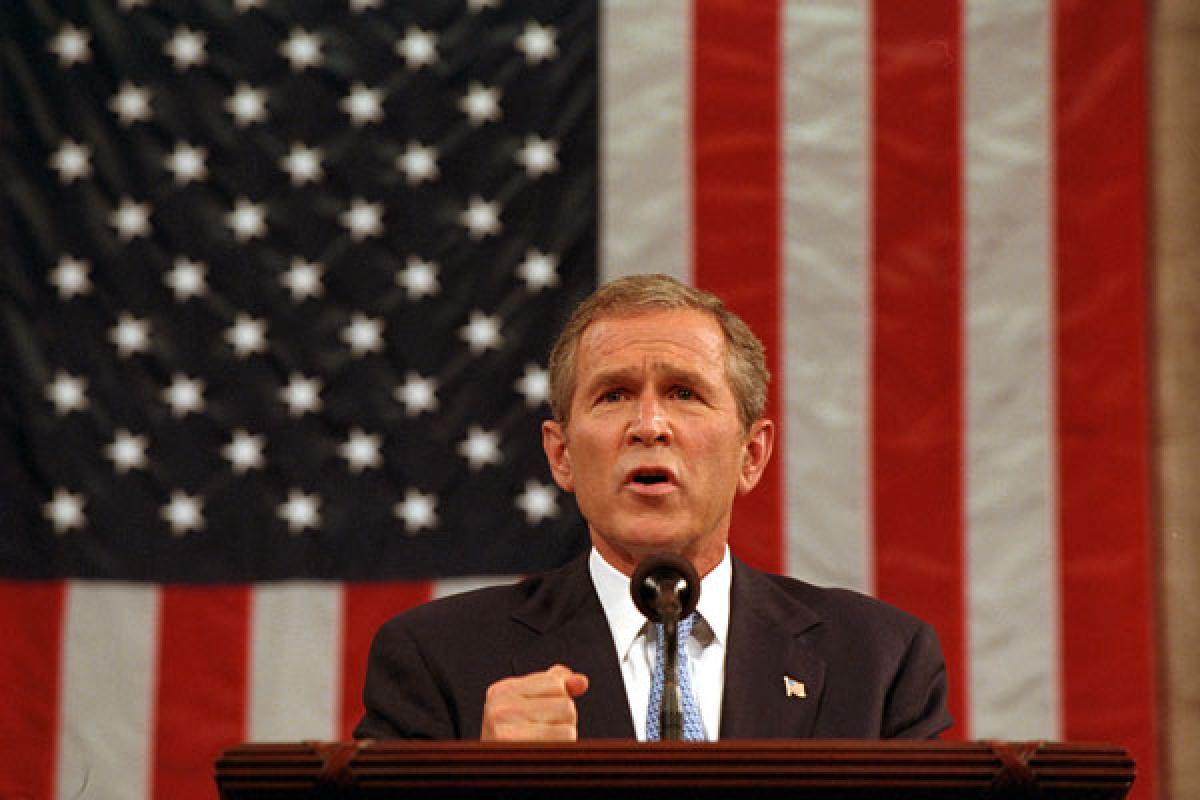
In February 2005 the CIA confirmed that some individuals in its custody had been subjected to “enhanced interrogation techniques,” including waterboarding (interrupted or controlled drowning, often called simulated drowning), which was generally regarded as a form of torture under international law. The CIA’s position that waterboarding did not constitute torture had been based on the legal opinions of the Justice Department and specifically on a secret memo issued in 2002 that adopted an unconventionally narrow and legally questionable definition of torture. After the memo was leaked to the press in June 2004, the Justice Department rescinded its opinion. In 2005, however, the department issued new secret memos declaring the legality of enhanced interrogation techniques, including waterboarding. The new memos were revealed in news reports in 2007, prompting outrage from critics of the administration. In July 2007 Bush issued an executive order that prohibited the CIA from using torture or acts of cruel, inhuman, or degrading treatment, though the specific interrogation techniques it was allowed to use remained classified. In March 2008 Bush vetoed a bill directed specifically at the CIA that would have prevented the agency from using any interrogation technique, such as waterboarding, that was not included in the U.S. Army’s field manual on interrogation.
The Iraq War

Road to war
In September 2002 the administration announced a new National Security Strategy of the United States of America. It was notable for its declaration that the United States would act “preemptively,” using military force if necessary, to forestall or prevent threats to its security by terrorists or “rogue states” possessing biological, chemical, or nuclear weapons—so-called weapons of mass destruction.
At the same time, Bush and other high administration officials began to draw worldwide attention to Iraqi Pres. Ṣaddām Ḥussein and to suspicions that Iraq possessed or was attempting to develop weapons of mass destruction in violation of United Nations Security Council resolutions. In November 2002 the Bush administration successfully lobbied for a new Security Council resolution providing for the return of weapons inspectors to Iraq. Soon afterward Bush declared that Iraq had failed to comply fully with the new resolution and that the country continued to possess weapons of mass destruction. For several weeks, the United States and Britain tried to secure support from other Security Council members for a second resolution explicitly authorizing the use of force against Iraq (though administration officials insisted that earlier resolutions provided sufficient legal justification for military action). In response, France and Russia, while agreeing that Iraq had failed to cooperate fully with weapons inspectors, argued that the inspections regime should be continued and strengthened.
As part of the administration’s diplomatic campaign, Bush and other officials frequently warned that Iraq possessed weapons of mass destruction, that it was attempting to acquire nuclear weapons, and that it had long-standing ties to al-Qaeda and other terrorist organizations. In his State of the Union address in January 2003, Bush announced that Iraq had attempted to purchase enriched uranium from Niger for use in nuclear weapons. The subsequent determination that some intelligence reports of the purchase had relied on forged documents complicated the administration’s diplomatic efforts in the United Nations. Meanwhile, massive peace demonstrations took place in several major cities around the world.
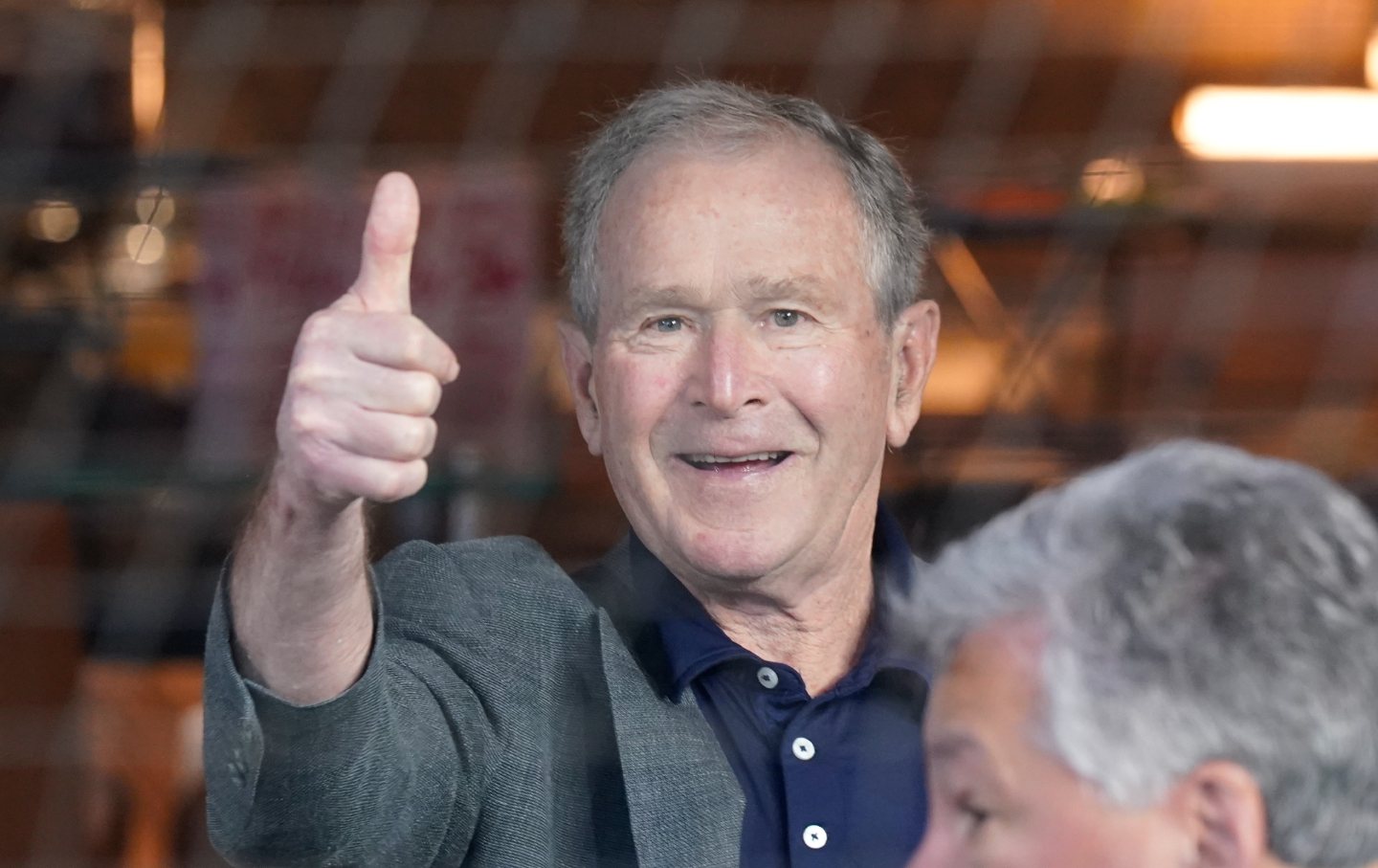
Operation Iraqi Freedom
Finally, Bush announced the end of U.S. diplomacy. On March 17 he issued an ultimatum to Ṣaddām, giving him and his immediate family 48 hours to leave Iraq or face removal by force. Bush also indicated that, even if Ṣaddām relinquished power, U.S. military forces would enter the country to search for we
After Ṣaddām’s public refusal to leave and as the 48-hour deadline approached, Bush ordered the invasion of Iraq, called Operation Iraqi Freedom, to begin on March 20 (local time). In the ground phase of the Iraq War, U.S. and British forces quickly overwhelmed the Iraqi army and irregular Iraqi fighters, and by mid-April they had entered Baghdad and all other major Iraqi cities and forced Ṣaddām’s regime from power.
In the wake of the invasion, hundreds of sites suspected of producing or housing weapons of mass destruction within Iraq were investigated. As the search continued without success into the following year, Bush’s critics accused the administration of having misled the country into war by exaggerating the threat posed by Iraq. In 2004 the Iraq Survey Group, a fact-finding mission comprising American and British experts, concluded that Iraq did not possess weapons of mass destruction or the capacity to produce them at the time of the invasion, though it found evidence that Ṣaddām had planned to reconstitute programs for producing such weapons once UN sanctions were lifted. In the same year, the bipartisan 9-11 Commission (the National Commission on Terrorist Attacks Upon the United States) reported that there was no evidence of a “collaborative operational relationship” between Iraq and al-Qaeda. Ṣaddām, who went into hiding during the invasion, was captured by U.S. forces in December 2003 and was executed by the new Iraqi government three years later.
apons of mass destruction and to stabilize the new government.
After Ṣaddām’s public refusal to leave and as the 48-hour deadline approached, Bush ordered the invasion of Iraq, called Operation Iraqi Freedom, to begin on March 20 (local time). In the ground phase of the Iraq War, U.S. and British forces quickly overwhelmed the Iraqi army and irregular Iraqi fighters, and by mid-April they had entered Baghdad and all other major Iraqi cities and forced Ṣaddām’s regime from power.
In the wake of the invasion, hundreds of sites suspected of producing or housing weapons of mass destruction within Iraq were investigated. As the search continued without success into the following year, Bush’s critics accused the administration of having misled the country into war by exaggerating the threat posed by Iraq. In 2004 the Iraq Survey Group, a fact-finding mission comprising American and British experts, concluded that Iraq did not possess weapons of mass destruction or the capacity to produce them at the time of the invasion, though it found evidence that Ṣaddām had planned to reconstitute programs for producing such weapons once UN sanctions were lifted. In the same year, the bipartisan 9-11 Commission (the National Commission on Terrorist Attacks Upon the United States) reported that there was no evidence of a “collaborative operational relationship” between Iraq and al-Qaeda. Ṣaddām, who went into hiding during the invasion, was captured by U.S. forces in December 2003 and was executed by the new Iraqi government three years later.
:max_bytes(150000):strip_icc():focal(704x389:706x391)/george-w-george-h-w-bush-83c20d49839b41cda0571ffe58a84b1b.jpg)
Occupation and insurgency
Although the Bush administration had planned for a short war, stabilizing the country after the invasion proved difficult. From May 1, when Bush declared an end to major combat in Iraq, to the end of December 2003, more than 200 U.S. soldiers were killed as a result of attacks by Iraqis. During the next four years the number of U.S. casualties increased dramatically, reaching more than 900 in 2007 alone. (The number of Iraqis who died during the invasion and insurgency is uncertain.) Widespread sectarian violence, accompanied by regular and increasingly deadly attacks on military, police, and civilian targets by militias and terrorist organizations, made large parts of the country virtually ungovernable. The increasing numbers of U.S. dead and wounded, the failure to uncover weapons of mass destruction, and the enormous cost to U.S. taxpayers (approximately $10 billion per month through 2007) gradually eroded public support for the war; by 2005 a clear majority of Americans believed that it had been a mistake. By the fifth anniversary of Operation Iraqi Freedom in March 2008, some 4,000 U.S. soldiers had been killed. As the death toll mounted, Bush’s public-approval ratings dropped, falling below 30 percent in many polls.
While acknowledging that it had underestimated the tenacity of the Iraqi resistance, the Bush administration maintained that part of the blame for the continuing violence lay with Iran, which it accused of supplying weapons and money to Iraqi-based terrorist groups. In his State of the Union address in 2002, Bush had warned that Iran (along with Iraq and North Korea) was part of an “axis of evil” that threatened the world with its support of terrorism and its ambition to acquire nuclear weapons. In 2006–07 the United States joined other members of the Security Council in condemning Iran’s nuclear research program. The administration’s repeated warnings concerning a possible Iranian nuclear weapon led to speculation that Bush was contemplating military action against the country. In December 2007, however, the administration’s suspicions were contradicted by the National Intelligence Estimate, a consensus report of U.S. intelligence agencies, which declared with “high confidence” that in 2003 Iran had abandoned attempts to develop a nuclear weapon.
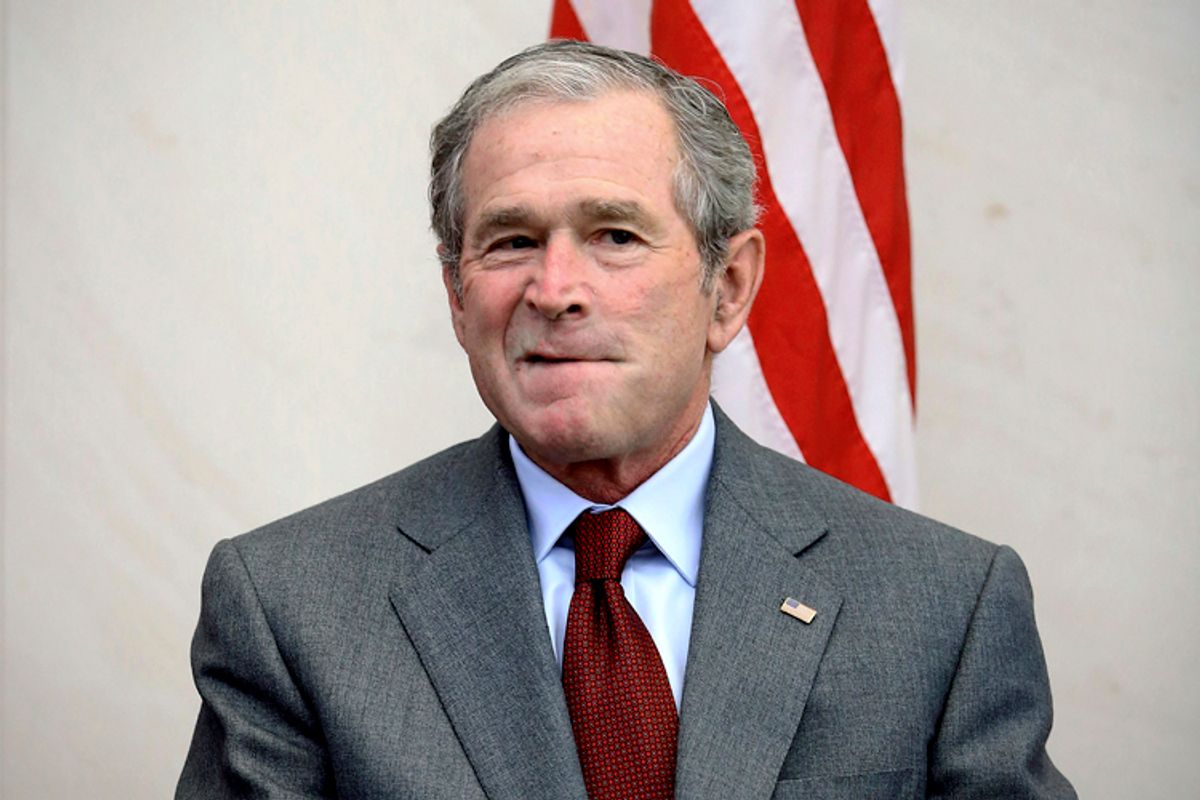
Foreign aid
In his State of the Union address in January 2003, Bush proposed an ambitious program to address the humanitarian crisis created by the HIV/AIDS pandemic in 15 countries in Africa and the Caribbean. With a budget of $15 billion over a five-year period, the President’s Emergency Plan for AIDS Relief (PEPFAR) aimed to supply life-extending medications to 2 million victims of HIV/AIDS, to prevent 7 million new cases of the disease, and to provide care for 10 million AIDS sufferers and the orphaned children of AIDS victims. The program was widely praised in the United States, even by Bush’s critics, and generated enormous goodwill toward the Bush administration in Africa. Medical professionals and public health officials welcomed the greater availability of retroviral drugs but generally objected to the program’s requirement that one-third of prevention funds be spent on teaching sexual abstinence and marital fidelity.
In January 2004 the Bush administration established the Millennium Challenge Corporation to distribute development aid to poor countries that demonstrated a commitment to democracy, free enterprise, and transparent governance. The agency’s innovative approach allowed recipient countries to design and manage their own multiyear programs to reduce poverty and promote economic growth. By 2008 the corporation had approved some $5 billion in grant requests, though relatively little of the money had been dispersed.
The Bush administration’s foreign aid programs were designed to serve its declared foreign policy goal of promoting democracy abroad, especially in parts of the world plagued by poverty and war. In eastern Europe, Bush supported expanding the membership of the North Atlantic Treaty Organization (NATO) as a means of securing democracy and stability in war-ravaged or formerly communist countries. During his presidency NATO gained seven new members: Bulgaria, Estonia, Latvia, Lithuania, Romania, Slovakia, and Slovenia.
Domestic affairs

